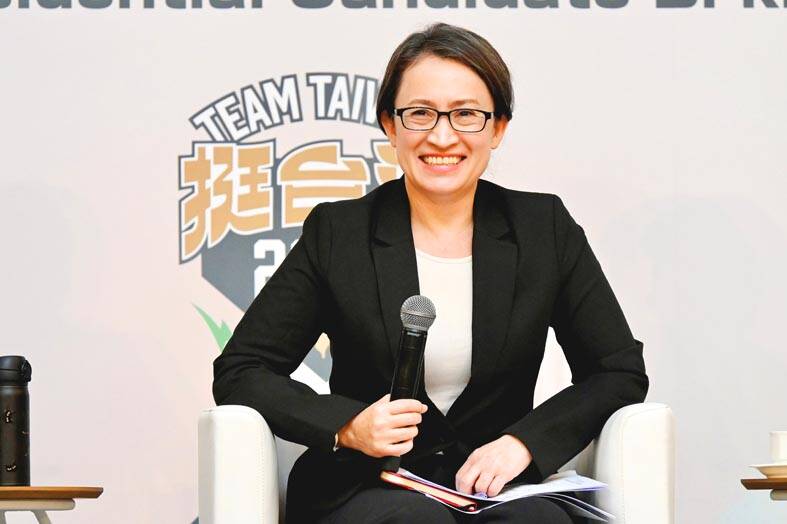Taiwan should “trust, but verify” reports that Chinese President Xi Jinping (習近平) denied that Beijing plans to invade Taiwan in 2027, Democratic Progressive Party (DPP) vice presidential candidate Hsiao Bi-khim (蕭美琴) told reporters yesterday.
“We anticipate and we hope that Chairman Xi Jinping was sincere when he said there was no timetable” for bringing Taiwan under control by force, said Hsiao, who earlier this week resigned as the representative to the US to join the ticket of DPP nominee, Vice President William Lai (賴清德).
Borrowing a phrase from former US president Ronald Reagan — which US President Joe Biden also used after his bilateral meeting with Xi in San Francisco on Wednesday last week — Hsiao said that Taiwan should “trust, but verify.”

Photo: George Tsorng, Taipei Times
A senior US administration official cited Xi as denying reports that China planned to take military action against Taiwan in 2027 or 2035 during last week’s bilateral meeting.
However, Xi also laid out the conditions under which force could be used, the official said, without specifying what those conditions were.
While the future Lai administration would welcome every opportunity to work with Beijing to maintain the “status quo,” Taiwan needs to continue building up its capability so as to deal with cross-strait relations with more confidence, Hsiao said.
Hsiao alluded to a “four-pillar plan” for peace proposed by Lai, with Taiwan boosting its defense capability and economic security, while seeking international partnerships and “principled and pragmatic” cross-strait relations.
The plan was modeled on the policy of outgoing President Tsai Ing-wen (蔡英文), with whom Beijing has refused to establish official contact, despite repeated requests during her eight years in office.
However, with Beijing labeling Lai and Hsiao as “separatists,” Hsiao was asked how the DPP ticket aims to resume government-to-government talks if elected in January.
Hsiao reiterated that they “remain open to dialogue” and would be “committed to the status quo.”
“It’s also important that [those in] the international community who agree with our position in continuing peace and stability in the Taiwan Strait make clear to our counterpart across the Taiwan Strait that dialogue is the only way to resolve differences,” Hsiao said.
“War is not an option,” she added.
When it comes to the US, Taiwan has to forge unified and bipartisan support, Hsiao said, adding that expanding broad support among Americans was critical.
“American support to Taiwan cannot be limited to the beltway,” Hsiao said, referring to the Washington political scene. “A rock solid partnership with the United States is critically important right now.”
Speaking of her decision to join Lai’s ticket, Hsiao, who had served four non-consecutive terms as a legislator prior to being posted to Washington in 2020, acknowledged having “tremendous hesitation” about returning to Taiwan and getting involved again in domestic politics.
While such a decision was “not an easy one,” Hsiao said that her alliance with Lai was forged based on their shared commitment to preserve Taiwan’s freedom and democracy.
Additional reporting by Reuters

SECURITY: As China is ‘reshaping’ Hong Kong’s population, Taiwan must raise the eligibility threshold for applications from Hong Kongers, Chiu Chui-cheng said When Hong Kong and Macau citizens apply for residency in Taiwan, it would be under a new category that includes a “national security observation period,” Mainland Affairs Council (MAC) Minister Chiu Chui-cheng (邱垂正) said yesterday. President William Lai (賴清德) on March 13 announced 17 strategies to counter China’s aggression toward Taiwan, including incorporating national security considerations into the review process for residency applications from Hong Kong and Macau citizens. The situation in Hong Kong is constantly changing, Chiu said to media yesterday on the sidelines of the Taipei Technology Run hosted by the Taipei Neihu Technology Park Development Association. With

A US Marine Corps regiment equipped with Naval Strike Missiles (NSM) is set to participate in the upcoming Balikatan 25 exercise in the Luzon Strait, marking the system’s first-ever deployment in the Philippines. US and Philippine officials have separately confirmed that the Navy Marine Expeditionary Ship Interdiction System (NMESIS) — the mobile launch platform for the Naval Strike Missile — would take part in the joint exercise. The missiles are being deployed to “a strategic first island chain chokepoint” in the waters between Taiwan proper and the Philippines, US-based Naval News reported. “The Luzon Strait and Bashi Channel represent a critical access

‘FORM OF PROTEST’: The German Institute Taipei said it was ‘shocked’ to see Nazi symbolism used in connection with political aims as it condemned the incident Sung Chien-liang (宋建樑), who led efforts to recall Democratic Progressive Party (DPP) Legislator Lee Kun-cheng (李坤城), was released on bail of NT$80,000 yesterday amid an outcry over a Nazi armband he wore to questioning the night before. Sung arrived at the New Taipei City District Prosecutors’ Office for questioning in a recall petition forgery case on Tuesday night wearing a red armband bearing a swastika, carrying a copy of Adolf Hitler’s Mein Kampf and giving a Nazi salute. Sung left the building at 1:15am without the armband and apparently covering the book with a coat. This is a serious international scandal and Chinese

COUNTERINTELLIGENCE TRAINING: The ministry said 87.5 percent of the apprehended Chinese agents were reported by service members they tried to lure into becoming spies Taiwanese organized crime, illegal money lenders, temples and civic groups are complicit in Beijing’s infiltration of the armed forces, the Ministry of National Defense (MND) said in a report yesterday. Retired service members who had been turned to Beijing’s cause mainly relied on those channels to infiltrate the Taiwanese military, according to the report to be submitted to lawmakers ahead of tomorrow’s hearing on Chinese espionage in the military. Chinese intelligence typically used blackmail, Internet-based communications, bribery or debts to loan sharks to leverage active service personnel to do its bidding, it said. China’s main goals are to collect intelligence, and develop a